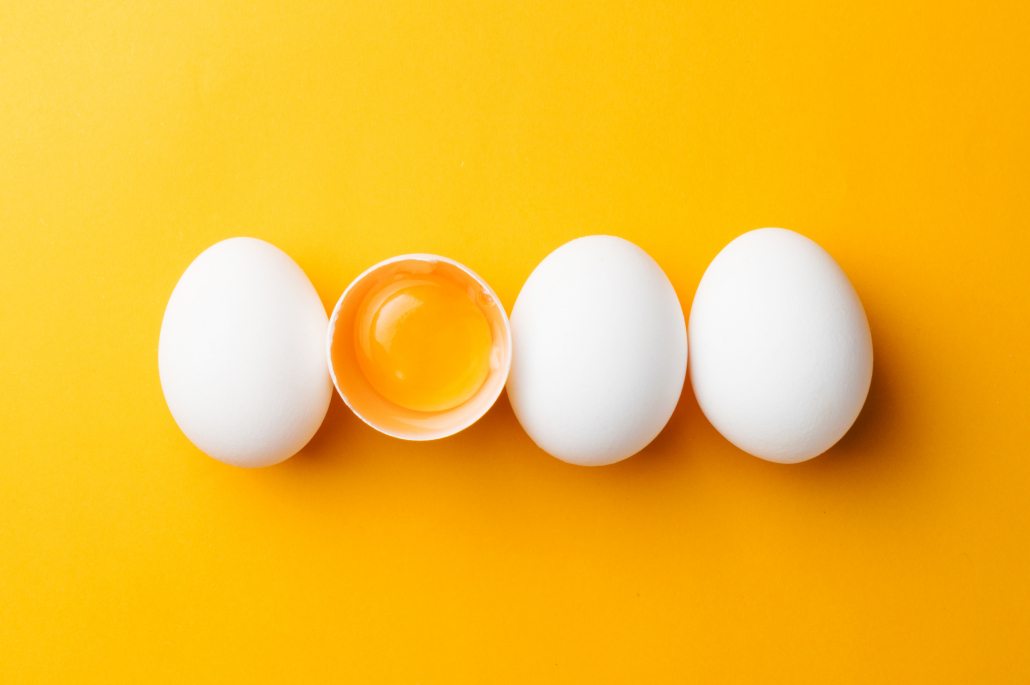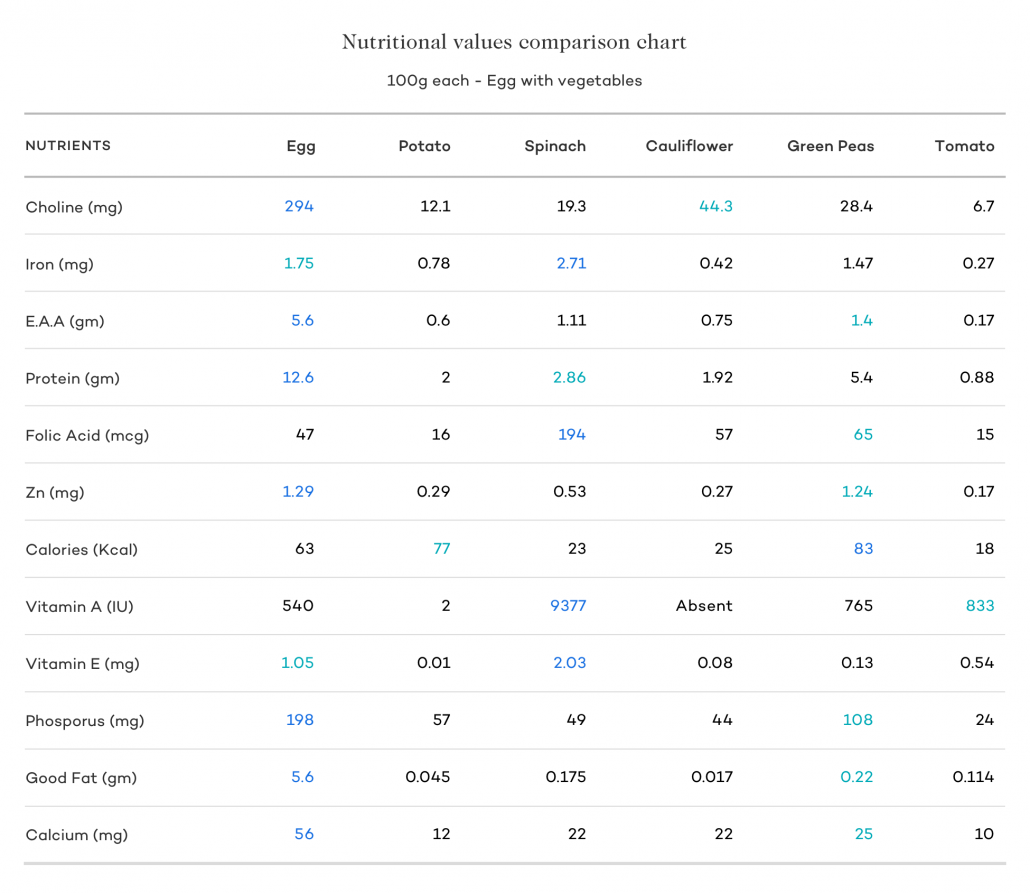We include products in articles we think are useful for our readers. If you buy products or services through links on our website, we may earn a small commission.
Are Eggs Good for You? You Might Be Surprised

Table of Contents
Are eggs good for you? Sure, they might have some important nutrients, but what about all that cholesterol? If you’re expecting the answer to be no, then you’re in for one heck of a surprise.
Eggs can be very good for you, and so is dietary cholesterol.
Truth is, eggs (along with cholesterol) are among the most unfairly slandered foods out there. There’s a reason the soaring prices of eggs sparked civil unrest in Iran in 2017; they’re a bonafide superfood, and one of the healthiest foods on the planet!
Let’s take a closer look at what makes eggs so good for you.
Egg Nutrition
Eggs contain many nutrients that make them one of the planet’s top superfoods. One large boiled egg has only about 77 calories yet contains:
- Every vitamin except for vitamin C
- All essential minerals
- Six grams of protein
- Five grams of healthy fats
- Barely any sugar or carbs
- Antioxidants
- Choline
Vitamins in Eggs
Eggs are a substantial source of vitamins. This is because eggs must contain all of the vitamins necessary to grow an animal. Remarkably, eggs contain every vitamin except for vitamin C. Birds can synthesize vitamin C from glucose, and, therefore, don’t need it from the egg.
Eating a whole egg, including the yolk, provides a healthy punch of vitamins that can help you satisfy your daily needs. By eating just two whole eggs, you can obtain 10-30% of your daily vitamin requirements.
On average, one whole egg (50 grams) contains:
- 10% daily value of vitamin A
- 15% daily value of vitamin D
- 15% daily value of vitamin E
- 2% daily value of vitamin B1
- 18% daily value of vitamin B2
- 15% daily value of vitamin B5
- 7% daily value of vitamin B6
- 50% daily value of vitamin B12
Minerals in Eggs
Eggs contain many minerals that are essential for a wide range of bodily processes including cardiovascular health, immunity, and fertility. On average, one whole egg or 50 grams of an egg contains:
- 6% daily value of iron
- 2% daily value of iron
- 6% daily value of zinc
- 14% daily value of phosphorous
- 1% daily value of potassium
- 3% daily value of sodium
- 4% daily value of copper
- 2% daily value of magnesium
- 1% daily value of manganese
- 28% daily value of selenium
Protein and Fat in Eggs
Eggs are a great low-cost source of animal protein and essential fats. The egg yolk primarily consists of high-density lipoproteins (HDL) and low-density lipoproteins (LDL), which are both fat and protein. These lipoproteins are known as cholesterol.
While eggs contain high amounts of cholesterol, they do not increase the risk of heart disease in healthy individuals.[1] Nor is there any credible link between dietary cholesterol and blood cholesterol levels.

Eggs and Heart Disease
Since the 1970s, studies have inaccurately claimed that eggs increase the risk of heart disease in healthy people. However, recent research suggests that eating eggs does not impact your risk for heart disease.
A meta-analysis looking at numerous studies found that individuals with heart disease risk factors can safely consume seven eggs per week as part of a healthy diet. Similarly, Harvard researchers studying more than 80,000 female nurses found that consuming about an egg a day was not associated with a higher risk of heart disease.
Other research shows that eating eggs may even reduce the risk of heart disease. One study following half a million Chinese adults found that people who ate eggs daily had a 14% lower risk of major cardiac events, an 11% lower risk of CVD, a 12% lower risk of ischemic heart disease, and an 18% lower risk of CVD death.
The Cholesterol Myth
Much of the misinformation about eggs is due to the fact that eggs are the most cholesterol-rich food. One egg yolk contains around 237 mg of cholesterol. But eating foods rich in cholesterol does not increase your cholesterol levels.
In fact, eating a diet high in carbohydrates (not cholesterol) is likely the primary factor for high cholesterol levels. Studies show that eating more than 60% of your calories from carbohydrates raises blood cholesterol levels.
Carbs spike your insulin levels, which causes the cells in your body to produce more LDL cholesterol. When LDL levels are elevated, cholesterol accumulates in the artery walls, which causes inflammation and oxidation. This can lead to the development of heart disease and other complications such as stroke.
By eating eggs and other foods that are low in sugars and carbohydrates, you can reduce your insulin levels and stabilize your cholesterol levels.
Numerous studies show that eggs consistently increase HDL (“good”) cholesterol. And 70% of people experience no increase in total or LDL cholesterol. Some people may experience a mild increase in a benign subtype of LDL that does not affect cardiovascular function.
Health Benefits of Eggs
With their robust offering of healthy fats, proteins, vitamins, and minerals, it’s no surprise that eggs offer a variety of health benefits supporting our bodies’ most critical functions.
Improved Fertility
Eggs are a fertility superfood because they contain essential nutrients for conception including Vitamin A, E, B12, folate, selenium, and zinc.
Fatty acids are also an important nutrient in eggs that promote fertility. Research shows that consuming omega-3 fatty acids improves fertility in women. Men’s fertility may also benefit from eating eggs. Shockingly, 30-80% of male subfertility (a delay in conceiving) is due to oxidative stress. Eggs naturally contain antioxidants, which combat oxidative stress and improve sperm quality in men. Eggs also support male fertility by providing a natural source of selenium, vitamin B12, and vitamin E ,which together reduce sperm DNA damage, and increase sperm count, motility, and morphology.
Most of the nutrients that support fertility are in the egg yolk, so don’t forget to eat the whole egg!
Safe Fetal Development
Eggs contain many nutrients that promote safe fetal development.
Iron
Iron helps transport oxygen throughout the body. It also supports physical growth, neurological development, cellular functioning, and hormone synthesis. Pregnant women need adequate iron levels to help babies grow. Low iron intakes can increase the risk of:
- Maternal and infant mortality
- Premature birth
- Low birthweight
- Impaired cognitive and behavioral development
Vitamin B12
B12 crosses the placenta during pregnancy and is present in breast milk. This vitamin is responsible for:
- Red blood cell formation
- Neurological function
- DNA synthesis
Obtaining adequate vitamin B12 during pregnancy and after birth can prevent complications such as:
Choline
Hard-boiled eggs are the second-best source of choline after beef liver. One large egg contains 147 mg of choline, which is 25% of the recommended daily value. The egg yolk contains the majority of choline.
Surprisingly, 90-95% of pregnant women don’t consume the recommended amount of choline. Low choline levels in pregnancy can result in neural tube defects. Eating eggs before and during pregnancy can improve choline levels and reduce the risk of birth defects.
Better Heart Health
Eggs contain many beneficial nutrients that may reduce your risk of heart disease. Vitamins A, E, B2, B6, and B12 dilate blood vessels and reduce the accumulation of cholesterol in the arteries. This can prevent complications such as:
- Angina pectoris (chest pain)
- Atherosclerosis (buildup of plaque in the artery walls)
- Myocardial infarction (heart attack)
Moreover, egg yolk contains antioxidants such as lutein and zeaxanthin, which reduce plasma triglyceride (fat) levels and maintain total cholesterol levels. This decreases your risk of heart disease.
The HDL (good) cholesterol in eggs also possesses antioxidant properties. HDL cholesterol counteracts the effects of LDL cholesterol by removing cholesterol from your bloodstream.
Reduced Risk of Chronic Disease
Eating eggs may reduce your risk of chronic disease by bolstering your immune system. Vitamin E is an antioxidant that plays an important role in immune function. Vitamin E protects your cells from damaging molecules and may prevent chronic diseases such as heart disease and cancer. The antioxidants lutein and zeaxanthin in egg yolk can protect against cataracts and macular degeneration.
The zinc found in eggs also supports immune health by aiding your immune system in the destruction of bacteria and viruses.
Stronger Bones
Eggs promote bone health because they contain vitamin D, magnesium, and calcium.
One large egg contains 6% of the recommended daily value of vitamin D. Low vitamin D levels can lead to complications including, Rickets, Osteomalacia, and Osteoporosis.
Adding eggs to your diet can increase your vitamin D intake and strengthen your bones.
Improved Brain Health
As mentioned earlier, eggs are the second-best source of choline. Choline is a nutrient that influences brain health by regulating:
- Cellular maintenance and growth
- Neurotransmission
- Brain development
- Memory
- Mood
- Muscle control
Eating eggs can provide you with the necessary vitamins and minerals to maintain a healthy state of mind and avoid complications such as depression.
Enhanced Muscle Strength
Eating whole eggs is a great way to build and maintain muscle. Eggs provide protein along with magnesium–an essential mineral for proper neuromuscular functioning. The magnesium in eggs can enhance:
Weight Loss
Making eggs a daily addition to your diet may promote weight loss while maintaining muscle mass.
Researchers conducted a study with overweight and obese older adults and found that participants lost around 3% of their body weight while eating three whole eggs per day over 12 weeks. Moreover, no changes in muscle composition occurred.
Not All Eggs Are Equal
It’s important to keep in mind that not all eggs are equal. Depending on a hen’s living conditions, her eggs can differ in nutritional value.
Unfortunately, hens are often raised in factories, caged, and fed grain-based feed that reduces the final nutrient composition of their eggs.
Eating eggs that come from hens raised in better conditions yields a higher nutritional value compared to commercial systems. This includes free-range or pastured eggs, organic eggs, and homestead eggs.
When possible, it’s best to buy omega-3 enriched eggs or pastured eggs, which are healthier and more nutritious. But conventional supermarket eggs are still a good option if you don’t have access to alternatives.
Are Eggs Good for You? The Bottom Line
Contrary to popular belief, eggs don’t cause heart disease in healthy individuals — they actually offer protective benefits by helping to regulate your insulin and cholesterol levels.
The health benefits of eggs support:
- Fertility
- Fetal development
- Heart health
- Immune support
- Bone health
- Brain health
- Muscle strength
- Weight loss
The best way to get the most nutrients from eggs is to eat both the egg yolk and egg whites. Many people shy away from eating the egg yolk due to the misconceptions surrounding cholesterol. But the egg yolk contains the majority of nutrients.
Consider buying pastured eggs, free-range eggs, or omega-3 enriched eggs. These eggs provide a boost in nutrients compared to commercial eggs.
To learn more about eating a diet low in sugars and carbs, you can check out our free keto guide.




















